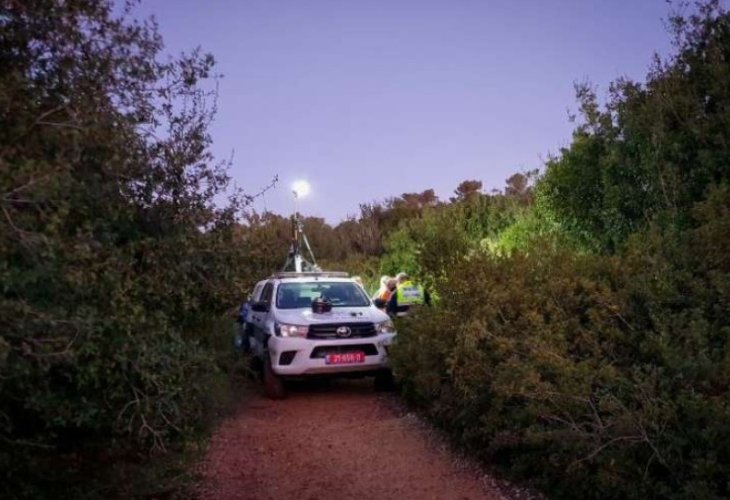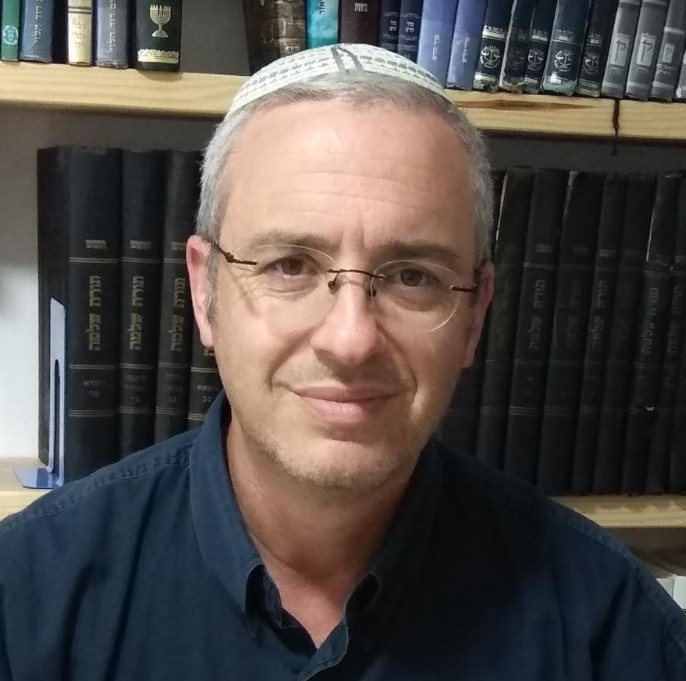"Esther Went for a Walk and Didn't Return": A Heartbreaking Interview
The quiet community of Tal Menashe mourns the brutal murder of Esther Horgan, a relationship advisor and mother of six, who was a symbol of love for the land. A local resident recounts Esther's love for the land, an unexpected condolence message from Arab workers, and the residents' call to expand the settlement in response to the attack.
 The scene of the horrific murder (Photo: Meir Vaknin/Flash90)
The scene of the horrific murder (Photo: Meir Vaknin/Flash90)A primeval landscape envelops the settlement of Tal Menashe, which is currently mourning the murder of Esther Horgan, a local resident, in a brutal terrorist attack. Somewhat ironically, not far from the settlement, investigators identify the ancient base of Sisera, the Canaanite army commander who fought against Israel. These days, the ordinarily peaceful settlement is bustling with visitors, from prominent rabbis to various figures in the political system. Many Jews from all over the country are arriving, having heard the dreadful news, to show their support, offer encouragement, and comfort the grieving community.
"The event shook the residents here," Elazar Roth, the head of the local Community Resilience Team, tells us, quickly clarifying that the residents are not afraid. "I don't see fear. We are people of faith, and life goes on despite the horrific event that happened. The murderers did not achieve their goal to instill fear and terror among the residents," he states.
The residents were informed of Esther's disappearance through a WhatsApp message sent to the phones of the settlement's residents. In the message, Esther's husband appealed to his friends and acquaintances to find out when they last saw his wife. "Binyamin returned home and found that he couldn't reach his wife by phone. He began asking neighbors and then sent a message in the community group saying that Binyamin was looking for her," Roth explains.
Did you think in those initial moments that the worst had happened?
"Initially, we all believed the search would end well. Nevertheless, Esther was a responsible woman, and we saw no natural reason for her disappearance, which did concern us a little. But despite that, we were confident we would find her safe and sound, as is usually the case." The calm in the settlement at that time did not reflect the actions on the ground. "We immediately sprang into action with full force," Roth recounts. "We gathered volunteers and divided them by areas, equipping them with tools to begin immediate searches throughout the settlement."
At night, the settlement of Tal Menashe came to life. Dozens of volunteers went out in teams of pairs to search for Esther. Meanwhile, the leaders of the search operation began interviewing people in the settlement to understand when she was last seen and perhaps through that, figure out where she went. As part of the investigation, the residents found the camera that contained the last footage of Esther walking towards the forest. "It later became clear to us that she met her end there, may her memory be a blessing," Roth says.
Later, security forces joined the search. Roth is full of praise for the forces, which he says did an outstanding job. "We in the settlement started the searches earlier because we have better access and knowledge of the area, but very quickly the police, the army, and additional forces organized and arrived at the settlement and began the searches. Large forces arrived in the area and they worked with us shoulder to shoulder, using capabilities we don't have." According to him, shortly after the disappearance, military forces from the Samaria regional brigade, alongside blue police officers and Border Police, alongside dog handlers and additional forces, were already stationed in the settlement. "Beyond that, I can't specify," Roth clarifies.
 Elazar Roth, Chairman of the Community Resilience Team
Elazar Roth, Chairman of the Community Resilience TeamThe Hardest News Arrived, and There Was a Need to Inform the Family
If at first the settlement thought it was a misunderstanding; an event that would end well, as the hours passed, anxiety began to gnaw. "I began to think that Esther might already be far from the settlement. We didn't know what to think in those moments," Roth notes. In parallel, he continued to work alongside the forces on the ground, in a quickly established joint situation room, which monitored all activity in the area.
Late at night, the order was given to stop the searches, to reorganize. The commanders sought to build a defined search plan and to unify all the searchers into one organized body. To do this, it was necessary to cease the activities of the situation room, and the professional staff began to build a search system on site. After long hours of searching, some of which Roth participated in himself and some of which he managed from the situation room, he asked to stop at his home for a moment. "Immediately upon entering the house," he recounts, "and before I could sit on a chair, the phone rang, informing me to come quickly. The hardest news had arrived, and there was a need to inform the family."
How was her body found?
"The body was found by a pair of searchers who went out to scan the area. The searchers passed through the area several times but did not find the body due to the terrain and darkness, coupled with the fact that Esther's body was hidden in the thicket. However, by chance, the two suddenly noticed something unfamiliar in the thicket, they moved the bushes slightly and discovered the horrific sight."
Immediately after finding Esther's body, Roth went with the settlement rabbi and a professional figure to the family's home to inform them of the heartbreaking news. "In such moments you don't think, but try to do the maximum you can to assist the family and manage the event. Personal emotions played less of a role in those moments," he says.
How did you inform the extended family?
"It was late at night, and to inform all the family members and also bring them to the settlement, cooperation of several factors was required. Esther's parents, who immigrated to Israel because of her, are elderly people around ninety years old, and it wasn't simple at all to inform them of the bitter news. Even technically, it was complicated, the parents live in Jerusalem, and cooperation with various factors was required at such a late hour," Roth says, his pain emphasized in every word.
The family's children, even those not residing in the place, were already in the settlement by that time, and one of Esther's sisters was also present, but we ensured she wouldn't drive to Jerusalem, therefore it was necessary to reach the parents another way. Fortunately, we managed to contact the sisters, as well as the Ministry of Welfare in Jerusalem and a medical professional who accompanied the sisters when they arrived at their parents' house and informed them of the hard news. It was also necessary for cooperation from the Foreign Ministry, which conveyed the information to a sister residing in Paris, and even assisted in bringing her to Israel quickly for the funeral, despite the coronavirus pandemic that makes movement around the world difficult.
Roth continues to note that the horrific terror event showed the best of the people of Israel. "People called and offered help, from the Samaria Regional Council that assisted greatly, and also good people from the area and all over the country, and not only from there. I received calls from Bnei Brak and also from Britain from people asking how they could help.
The Paths of Tal Menashe Are in Mourning. People Walk with Pain on Their Faces
Esther and Benjamin Horgan immigrated to Israel in their youth from France. Benjamin, the husband, came to Israel with his family at the age of 12, his future wife, Esther, immigrated alone at the age of 18. "Love for the land was deeply rooted in her heart," evidenced by what Esther and Benjamin did before the birth of their first daughter. Esther wanted her first child to be born in the holy city of Jerusalem. And indeed, before the birth, the couple moved for a short time to an apartment in Jerusalem, so that their first daughter would be born in the holy city, which Esther longed for during her time in exile. It was so important to her, a young woman who came alone from France for the land of Israel and the mitzvah of settling the land.
After their wedding, the Horgan couple built their home in Tel Aviv, and after several other stops, they decided to move to Samaria, to make the desert bloom, and chose the developing settlement of Tal Menashe. "They came to Tal Menashe 20 years ago, where they built their home, a well-kept and invested house," says Roth. "They thrived here in the settlement. Esther was in recent years a renowned relationship advisor and her husband, may he live a good life, is also a well-known person in the settlement and a true man of kindness."
In the small settlement of about 140 families, the Horgan family's six children grew up, two of whom even married daughters from the settlement. The small size of the settlement clarifies the magnitude of the pain we encounter there, people walk with pain on their faces. "Everyone knows everyone in the settlement, we often meet together, so the connection is very strong," Roth notes.
Do you now feel fear following the event?
Although Roth visited the area where Horgan was murdered multiple times: a forest loved by the locals, he does not express fear. "I think there is no fear," Roth responds. "I travel around the settlement and see people acting normally. In a sense, even the opposite, we suddenly feel how the whole people of Israel are with us, sharing in our heavy mourning. My phone constantly receives messages from Jews wanting to help, from Bnei Brak to Britain."
Roth has lived in the settlement for 17 years, which has grown over the years and continues to grow. Currently, about 140 families reside in the place, and the settlement seeks to further expand the place. Following the murder, the grieving locals demand from the Israeli government to double the settlement in response. "They don't want us to live in this area, and therefore there is no more fitting response to this barbaric act than expanding the settlement," clarifies Roth.
Given Tal Menashe's location, somewhere in Samaria, a condolence message received by the family shortly after the murder is particularly interesting. "Arab workers who worked some time ago in the home of Binyamin, may he live, and Esther, of blessed memory, approached a neighbor they knew and asked him to convey their condolences to the family. In their words, the workers expressed the special relationship they received from Esther and the unique way she treated them." Roth sighs and adds, "It's sad that this wonderful personality has left us in such a tragic way. May her memory be blessed."

